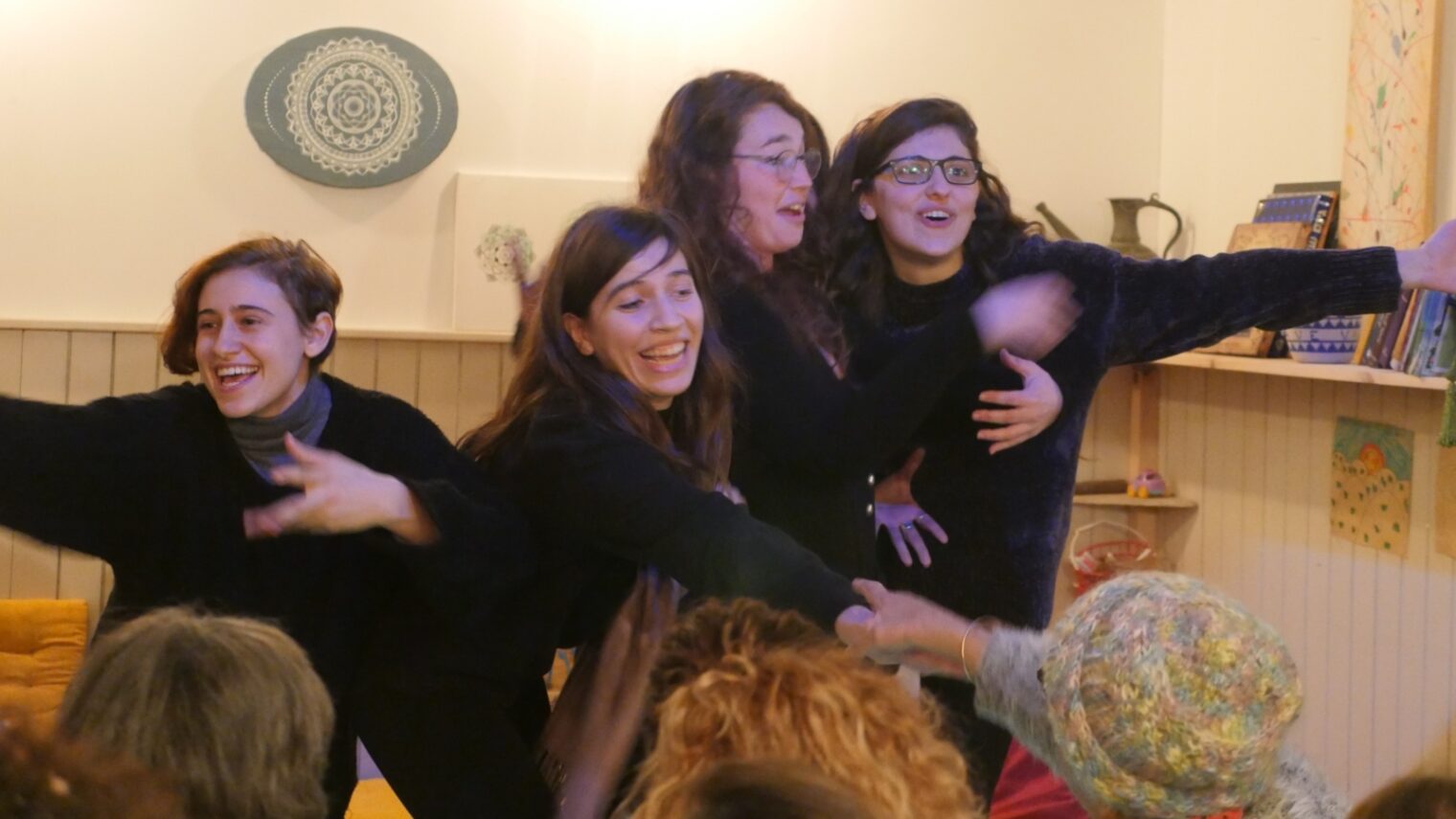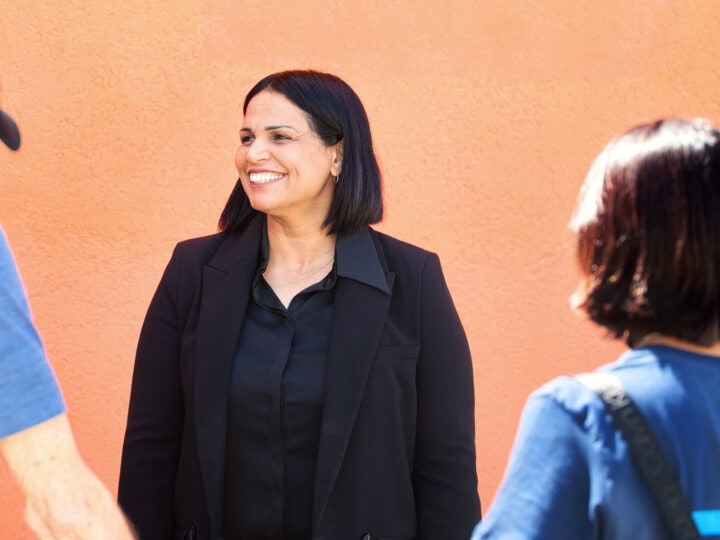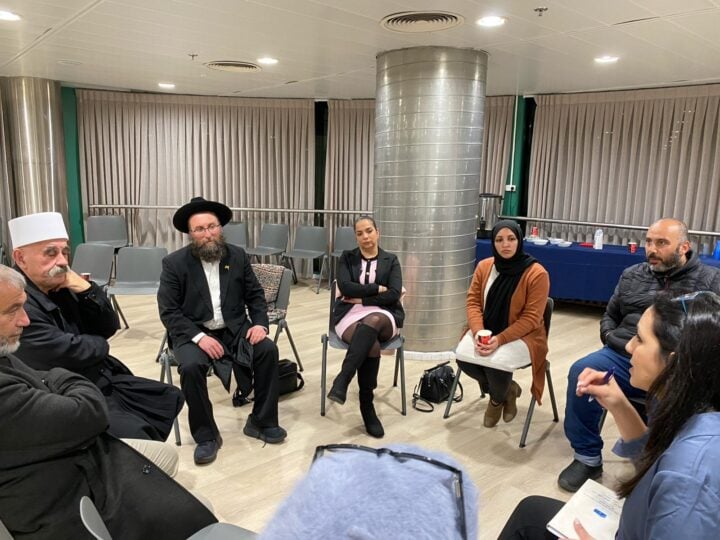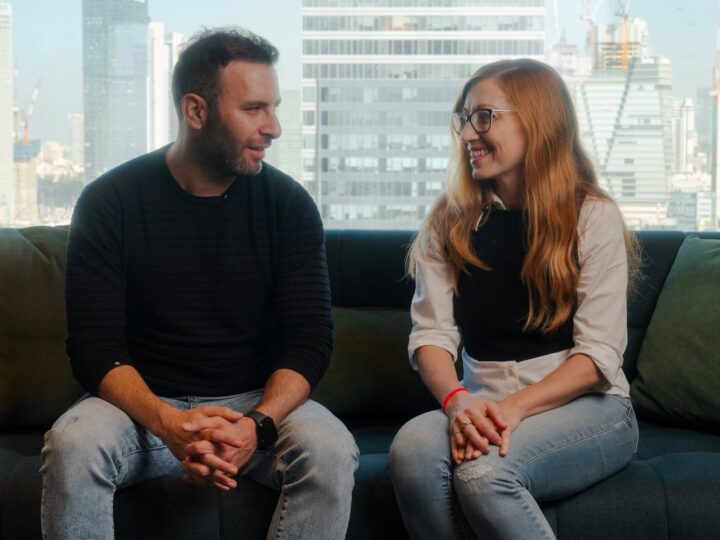“I am an Arab and I couldn’t hear a story from the other side. I always heard it with the ears of an Arab, thinking about who’s right and who’s wrong. Now I can listen with an open heart, human to human,” says Lamis Dakwar, a 35-year-old drama therapist from a Catholic Arab village in the Western Galilee.
Dakwar leads The Heart of Our Stories, a unique Arab and Jewish student troupe at Tel-Hai College in the Upper Galilee, a campus shared by 5,000 Jewish and Arab students.
The three-year-old ensemble performs playback theater, a form of improv where audience members tell stories from their lives and watch them enacted on the spot in order to gain perspective on the situation.
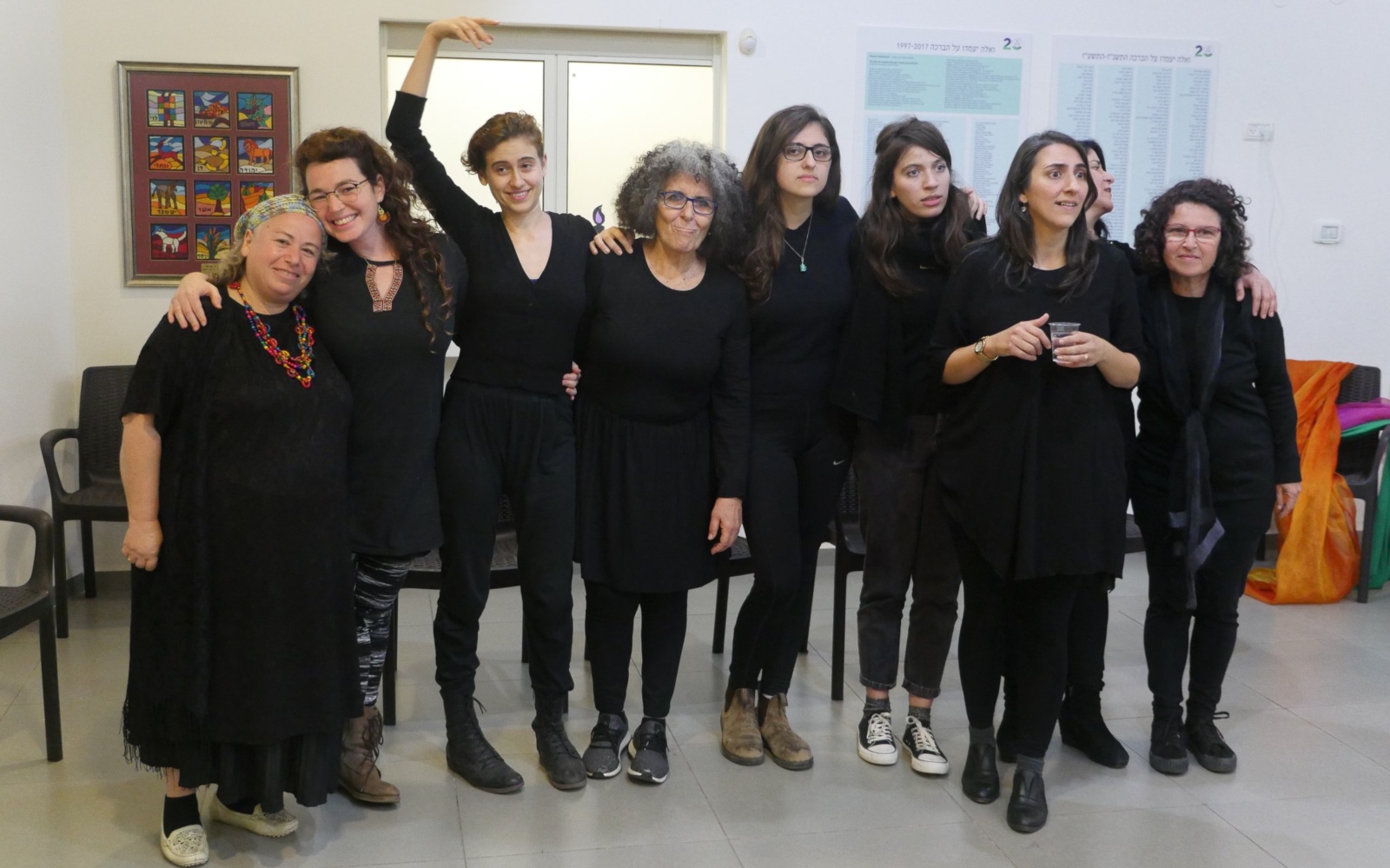
This is the second playback troupe established by Together Beyond Words, started in 2003 by nine Arab and Jewish Israeli women to promote coexistence, understanding and empathy.
Funded by donors mainly in the United States, the organization’s bilingual playback theater and listening/dialogue circles have reached thousands of women and men throughout Israel.
“The name ‘Together Beyond Words’ is not because we don’t use words but because we are able to deal with the deep emotional content that is also part of our conversation,” explains cofounder Nitsan Joy Gordon, a dance therapist.
“We have developed a multidisciplinary approach that includes movement, body work and deep listening designed to create deep connections while transforming pain and trauma. We’re not afraid of feelings. Emotions are the basis of our actions and if they are not somehow transformed, we will continue the cycle of conflict.”
Dakwar recalls a Jewish audience member who related that he’d wanted to live in an Arab village, but the residents made it clear he was unwelcome. He said he felt bewildered, angry and frustrated.
“This story was amazing to me, because I am not used to Jews wanting to live with Arabs and the Arabs rejecting them. It showed the other side of the coin. Suddenly we were not the victims and it was really a switch to hear the same pain from the other side,” says Dakwar.
The actresses played back the story faithfully. Their job isn’t to change or sugarcoat reality but to empower the teller and reveal potentially transformative insights for the whole audience.
“I told him it was a really effective story that shows we are all in the same boat,” Dakwar tells ISRAEL21c.
From Stage to Change
Gordon and cofounder Silvia Marjeyeh envisioned The Heart of Our Stories as a healthy alternative outlet for feelings that can otherwise lead to prejudice and violence on academic campuses.
It’s modeled after Together Beyond Words’ flagship playback ensemble, From Stage to Change, the first of its kind in the world.
From Stage to Change members are Arab (Christian, Druze and Muslim) and Jewish women — mothers, teachers, college students, social workers.
They perform two or three times a month in Arab, Jewish or mixed cities such as Rahat, Beersheva, Tel Aviv, Jerusalem and Beit Jala.
The actresses introduce the show’s topic, chosen by the host group. Each will share a brief story of her own about the topic – say, Arab-Jewish relations or family issues — and the other actresses play it back in various ways to demonstrate how the technique works.
“Then the leader asks the audience questions. For example, if it’s a group of teachers, she might ask them to share something significant that a student said. They play that back. Then we begin asking for stories about meaningful or transformational moments. We ask each one who is interested in telling their story to give it a title and to share their story with someone sitting next to them first so that they get into sharing,” says Gordon.
The person then comes onstage, tells the story to the group (in Hebrew or Arabic; a staff member translates) and chooses the actress who will portray him or her. Then he or she goes back to the audience and watches the story played back.
“Usually they sit next to someone from our staff who can support them because often they cry when they see their stories,” Gordon tells ISRAEL21c.
“The actresses are in the service of the person and the whole audience. When we’re finished, we ask how it was for them.”
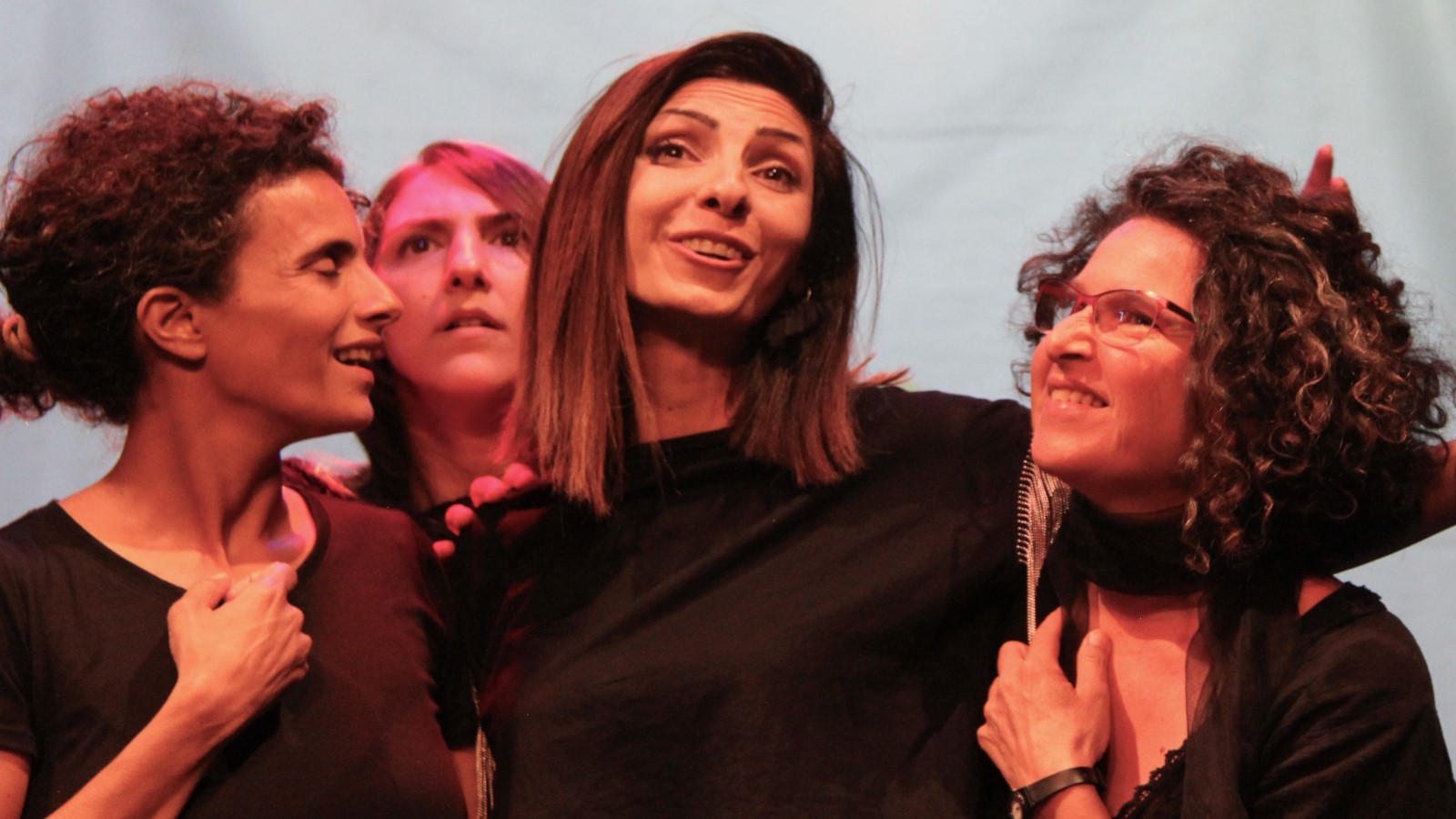
After every performance, the actresses divide the audience into smaller groups and lead storytelling circles. Those who chose not to share a story onstage may feel more confident sharing in this setting.
“The deep listening and sharing in a safe and accepting environment encourage compassion and acceptance towards ourselves and others,” Gordon explains.
Research has shown that storytelling — in words, songs, plays or films — activates parts of the brain that lead listeners to connect the story with their own experience, creating empathy and encouraging action, she says.
New perspectives
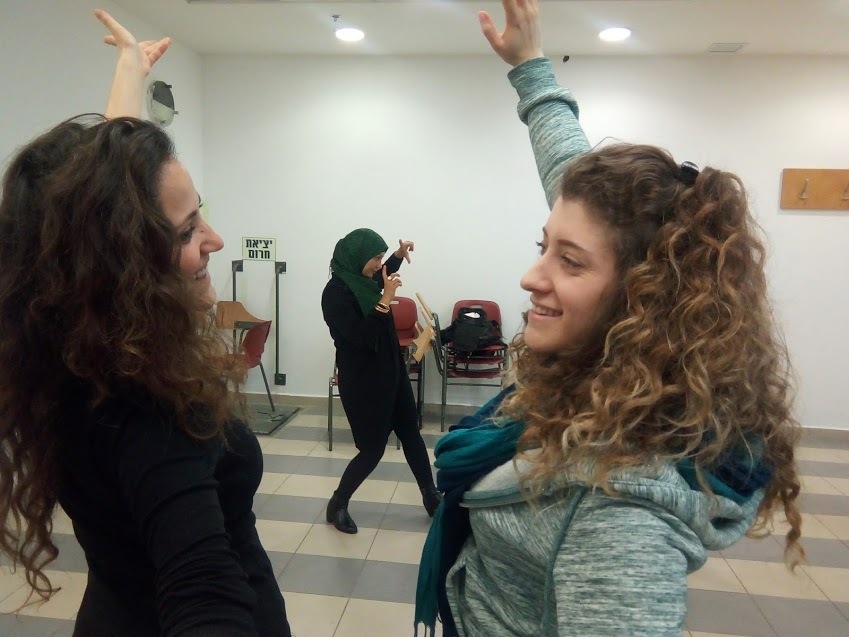
The Heart of Our Stories actress Chen Ben-Yosef Chen, 28, says participating in the troupe has been transformational.
“I feel that it opens up a lot of things inside myself that I can put out in the world,” she tells ISRAEL21c.
The group meets every Monday at Tel-Hai College for several hours. In the first half of the class, Gordon leads the nine Arab and Jewish female students in dance, music, movement and active listening.
“We tell a story about a situation or topic that we choose and that is how we open up to each other,” says Ben-Yosef.
“We really love each other and have a lot in common but there is a lot we don’t know about one another’s culture. We’re always learning new things about each other and how we see life. A lot of things have changed in my mind and now I judge a lot of things differently, through another person’s eyes.”
In the second half of the class, Dakwar hones their playback skills. The ensemble has performed for diverse audiences in the Upper Galilee. One audience was college students accompanied by elder residents with whom they volunteer. Another was high school teachers in an Arab village.
“It has trained me to look at another person not as an Arab or a Jew but as a human being,” says Ben-Yosef.
For more information, click here




